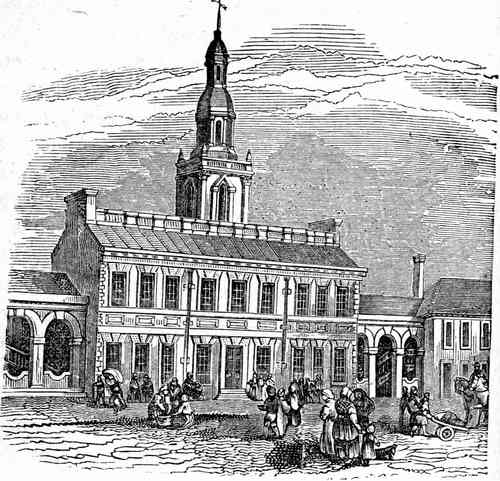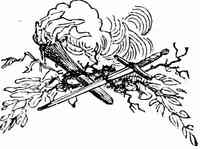Thrilling Incidents In American History
• Preface
Revolutionary War
• Opening Of The Revolution
• The Boston Massacre
• Affair of the Sloop Liberty
• Affair of the Gaspee
• The Tea Riot
• The Boston Port Bill
• The First Continental Congress-Consequent Parliamentary proceedings
• Organization of the Minute-Men
• Patrick Henry-Second Provincial Congress-First Military Enterprise
• Battles of Lexington and Concord
• Battle of Bunker's Hill
• Capture of Ticonderoga
• Second Continental Congress-Washington's Appointment
• Siege of Boston
• Incidents at the Evacuation of Boston
• Burning of Falmouth
• Arnold's Expedition to Quebec
• Siege of Quebec, and Death of Montgomery
• Scenes at Quebec during the Siege
• Expedition against Charleston
• The Declaration of Independence
• The Battle of Long Island
• Washington's Retreat through New Jersey-Capture of General Lee
• Battle of Trenton
• Battle of Princeton
• Capture of General Prescott
• Battle of Brandywine
• Battle of Germantown
• Battle of Red-Bank
• Attack on Fort Mifflin-Retirement of the Army to Valley Forge
• Battle of Bennington
• Murder of Miss M'Crea
• Battle of Stillwater
• Battle of Bemis' Heights, and Retreat of Burgoyne
• Capture of Forts Clinton and Montgomery
• Surrender of Burgoyne
• The Treaty with France
• Attack on Savannah, and Death of Pulaski
• Storming of Stony Point
• General Sullivan's Campaign against the Mohawks
• Tarleton's Quarters
• Battle of Camden, and Death of De Kalb
• Arnold's Treason
• The Loss of the Randolph
• The British Prison-Ships
• Capture of the Serapis
• Putnam's Feat at Horseneck
• Battle of Eutaw Springs
• Wayne's Charge at Green Spring
• Capture of the General Monk
• The Mutinies
• Battle of the Cowpens
• Capture of New London
• Massacre of Wyoming
• Surrender of Cornwallis
War With France
• Capture of L'Insurgente
• The Constellation and Vengeance
War With Tripoli
• Burning of the Philadelphia
• Bombardment of Tripoli
• Loss of the Intrepid
• Expedition of General Eaton
Second War With England
• Battle of Tippecanoe
• Capture of the Guerriere
• Tragical Affair of an Indian Chief
• Battle and Massacre at the River Raisin
• Captain Holmes's Expedition
• Capture of the Caledonia and Detroit
• The Wasp and Frolic
• Gallant Conduct of Lieutenant Allen at the Capture of the Macedonian
• Capture and Destruction of the Java
• Siege of Fort Meigs
• Capture of York, and Death of General Pike
• Defence of Sackett's Harbour
• Defence of Fort Stephenson
• Battle of Lake Erie
• Battle of the Thames
• Gallant Action of Commodore Chauncey under the guns of Kingston Citadel
• The Sacking of Hampton
• Capture of the Peacock
• Massacre at Fort Mimms
• Surrender of Weatherford
• Battle of Niagara
• BattIe of New Orleans
War With Mexico
• Battle of Palo Alto
• Battle of Resaca de la Palma
• Capture of Monterey
• Battle in the Streets of Monterey
• Thrilling Scenes in the Battle of Buena Vista
• Bombardment of Vera Cruz
• Battle of Cerro Gordo
• Battles of Contreras and Churubusco
• Storming of Chapultepec


Independence Hall, Philadelphia.
THE DECLARATION OF INDEPENDENCE.
 HE part taken by Adams and Jefferson in bringing about the Declaration of
Independence, is thus described by Mr. Everett:
HE part taken by Adams and Jefferson in bringing about the Declaration of
Independence, is thus described by Mr. Everett:
| In 1774, and on the 17th of June, a day destined to be in every way illustrious, Mr. Adams was elected a member of the Continental Congress, of which body he was signalized, from, the first, as a distinguished leader. In the month of June in the following year, when a commander-in-chief was to be chosen for the American armies, and when that appointment seemed in course to belong to the commanding general of the brave army from Massachusetts and the neighbouring states, which had rushed to the field, Mr. Adams nominated George Washington to that all-important post, and was thus far the means of securing the blessing of his guidance to the American armies. |
In August 1775, Mr. Jefferson took his seat in the Continental Congress, preceded by the fame of being one of the most accomplished and powerful champions of the cause, though among the youngest members of the body. It was the wish of Mr. Adams, and probably of Mr. Jefferson, that independence should be declared in the fall of 1775; but the country seemed not then ripe for the measure.
At length the accepted time arrived. In May 1776, the colonies, on the proposition of Mr. Adams, were invited by the General Congress to establish their several state governments. On the 7th of June the resolution of independence was moved by Richard Henry Lee. On the 11th a committee of five was chosen, to announce this resolution to the world; and Thomas Jefferson and John Adams stood at the head of this committee. From their designation by ballot to this most honourable duty, their elevated standing in the Congress might alone be inferred. In their amicable contention and deference each to the other of the great trust of composing the all-important docu- ment, we witness their patriotic disinterestedness and their mutual respect. This trust devolved on Jefferson, and with it rests on him the imperishable renown of having penned the Declaration of Independence of America. To have been the instrument of expressing, in one brief decisive act, the concentrated will and resolution of a whole family of states; of unfolding, in one all-important manifesto, the causes, the motives, the justification of the great movement io human affairs which was then taking place; to have been permitted to give the impress and peculiarity of his own mind to a charter of public right, destined, or rather let me say, already elevated to an importance, in the estimation of men, beyond everything human, ever borne on parchment, or expressed in the visible signs of thought, this is the glory of Thomas Jefferson. To have been among the first of those who foresaw, and foreseeing broke the way for this great consummation; to have been the mover of numerous decisive acts, its undoubted precursors; to have been among many able and generous spirits, that united in this perilous adventure, by acknowledgment unsurpassed in zeal, and unequalled in power; to have been exclusively associated with the author of the declaration; and then, in the exercise of an eloquence as prompt as it was overwhelming, to have taken the lead in inspiring the Congress to adopt and proclaim it, this is the glory of John Adams.
Nor was it among common and inferior minds, that these men enjoyed their sublime pre-eminence. In the body that elected Mr. Jefferson to draft the Declaration of Independence, there sat a patriot sage, than whom the English language does not boast a better writer, Benjamin Franklin. And Mr. Adams was pronounced by Mr. Jefferson himself the ablest advocate of independence, in a Congress which could boast among its members such men as Patrick Henry, Richard Henry Lee, and our own Samuel Adams. They were great and among great men; mightiest among the mighty, and enjoyed their lofty standing in a body of which half the members might with honour have presided over the deliberative councils of a nation.
| All glorious as their office in this council of sages has proved, they beheld the glory only in distant vision, while the prospect before them was shrouded with darkness and lowering with terror. "I am not transported with enthusiasm," is the language of Mr. Adams, the day after the resolution was adopted; "I am well aware of the toil, the treasure, and the blood it will cost, to maintain this declaration, to support and defend these states. Yet through all the gloom, I can see a ray of light and glory. I can see that the end is worth more than all the means." Nor was it the rash adventure of uneasy spirits, who had everything to gain and nothing to risk by their enterprise. They left all for their country's sake. Who does not see that Adams and Jefferson might have risen to any station in the British empire! They might have revelled in the royal bounty; they might have shared the imperial counsels; they might have stood within the shadow of the throne which they shook to its base. It was in the full understanding of their all but desperate choice, that they chose for their country. Many were the inducements which called them to another choice. The dread voice of authority; the array of an empire's power; the pleadings of friendship; the yearning of their hearts towards the land of their fathers' sepulchres- the land which the great champions of constitutional liberty still made venerable; the ghastly vision of the gibbet, if they failed; all the feelings which grew from these sources were to be stifled and kept down, for a dearer treasure was at stake. They were anything but adventurers, anything but malecontents. They loved peace, they loved order, they loved law, they loved a manly obedience to constitutional authority; but they chiefly loved freedom and their country; and they took up the ark of her liberties with pure hands, and bore it through in triumph, for their strength was in Heaven. |
